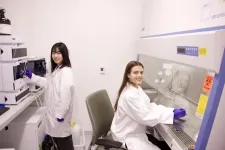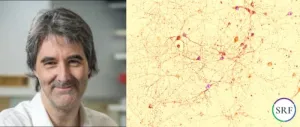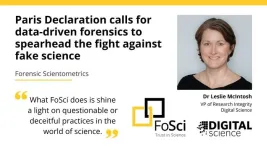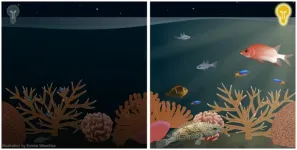Children’s Hospital Colorado research transforms the standard of care for childhood cancer
New FDA-approved drug greatly improves survival for children diagnosed with the most common form of childhood cancer
2024-12-18
(Press-News.org)
After participating in a global clinical trial, leaders at the Children’s Hospital Colorado (Children’s Colorado) Center for Cancer and Blood Disorders and the University of Colorado Cancer Center are celebrating results so transformative, they change the standard of care for treating most kids with B-cell acute lymphoblastic leukemia (B-ALL), the most common form of childhood cancer. The new therapy is less toxic than traditional chemotherapy, resulting in significantly fewer side effects like severe infections, mouth sores and bone marrow suppression, leading to improved quality of life for patients.
The findings were published in the New England Journal of Medicine and presented at the American Society of Hematology (ASH) Annual Meeting in early December. They show that adding the bi-specific T-cell engaging antibody blinatumomab to standard chemotherapy significantly improves three-year disease-free survival for children who have been newly diagnosed with B-ALL. The study was co-authored by Dr. Lia Gore, Section Head of the Center for Cancer and Blood Disorders at Children’s Colorado and Professor at University of Colorado School of Medicine, and Dr. Maureen O’Brien, Leukemia and Lymphoma Program Lead at Children’s Colorado and Professor at University of Colorado School of Medicine.
“The clinical trial closed early because the results were clear: Those not receiving the drug did significantly worse than those that were treated with blinatumomab,” said Dr. Gore. “This instantly changed the standard of care for patients at Children’s Colorado and across the nation.”
The data presented came from a phase 3 study, AALL1731, conducted by the Children’s Oncology Group (COG), the largest research organization for childhood cancer in the world. Earlier trials with blinatumomab were led by Dr. Gore and the Experimental Therapeutics Program team at Children’s Colorado. This large international trial was written by a team of COG researchers including Dr. Gore and other members of the COG acute lymphoblastic leukemia committee. The team at Children’s Colorado – including Dr. Meg Macy, Program Lead of Experimental Therapeutics Program, and Deb Schissel, Research Nurse – was instrumental to the early studies with blinatumomab and helped teach other sites around the world how to treat patients with the drug over the past 14 years.
“We started working on the first pediatric study of blinatumomab in 2009 and Children’s Colorado helped lead the treatment of patients in the U.S. with the new protocol in 2011,” said Dr. Gore. “I feel immensely proud of the team and the work that continues to happen in this field. This research means more kids will not only survive, but they will also thrive; with this treatment, kids will do better, feel better, their lives will be less negatively impacted by cancer. There is even greater hope that they will be treated with this regimen and never relapse.”
Of the patients in the AALL1731 study who received blinatumomab, 96% were disease-free for at least three years, and they were 61% less likely to have the cancer relapse than those in the trial who did not receive the drug. This demonstrates a practice-changing breakthrough for children diagnosed with B-ALL, and blinatumomab is now being used in most patients due to these findings. Many patients who did not receive blinatumomab the first time through had it added to their treatment plans to allow them to have the same positive outcomes.
The drug is administered via two 28-day continuous intravenous (IV) infusions and is most effective when given after the first month of standard chemotherapy, when the burden of the disease is low. The total course of treatment for childhood B-ALL takes two years. Researchers, including the team at Children’s Colorado, are working to use a form of blinatumomab that can be given as an injection under the skin without needing continuous IV infusions, which will further enhance quality of life for patients and families. Children’s Colorado will also be part of this next set of clinical trials.
“Children’s Colorado is a global leader in pediatric cancer research and treatment, and it is truly transformative to see such extraordinary results with this trial,” said Dr. Ronald J. Sokol, Chief Scientific Officer of Child Health at Children’s Colorado. “The data presented shows a significant improvement in disease-free survival for children with B-ALL and will potentially change the landscape of childhood cancer treatment for years to come.”
END
ELSE PRESS RELEASES FROM THIS DATE:
2024-12-18
For roughly a century, ever since Alexander Fleming’s accidental discovery of penicillin in 1928, fungi have proven to be a goldmine for medicines. They’ve provided treatments for a wide range of diseases, from infections and high cholesterol to organ rejection and even cancer.
However, the process by which fungi synthesize some of their most potent compounds remains opaque. This is especially true of cyclopentachromone, a key building block in fungal products whose derivatives have shown promise in fighting cancer and reducing inflammation, among other medicinal properties.
Reading Nature’s Instructions
While chemists have made progress in creating ...
2024-12-18
Mill Valley, CA – December 18, 2024 – The SynGAP Research Fund 501(c)(3) dba Cure SYNGAP1 announced a $108,867 grant to Dr. Michael Courtney and Dr. Li-Li Li at the Turku Bioscience Centre, University of Turku, Finland, to advance their research on SYNGAP1 missense variants. Their project seeks to better understand the functional impact of these mutations and explore drug repurposing as a potential therapeutic approach.
Dr. Courtney’s team will use advanced phenotyping techniques to assess how SYNGAP1 missense variants impact the protein’s ...
2024-12-18
NEW YORK, NY (Dec. 18, 2024)--Women born in the most sexist U.S. states experience faster memory decline in later years compared to women born in the least sexist states, a new study by researchers at Columbia University Vagelos College of Physicians and Surgeons has found.
The difference between being born in the most versus the least sexist state was equivalent to nine years of cognitive aging.
The study is one of a growing number of studies that have investigated links between structural sexism and health. Structural sexism, like structural racism, does not refer to personal incidences but to inequality in resources and power ...
2024-12-18
To identify and follow blood vessel-related changes in the brain that contribute to cognitive impairment and dementia, researchers and clinicians typically rely on MRI to evaluate “downstream” biological markers – those at the end of a cascade of events. But a multicenter study led by UCLA researchers could lead to a cost-effective blood test to identify changes occurring near the top of the chain, potentially identifying at-risk patients at an earlier stage.
“We studied a protein in the blood that is critical in the formation ...
2024-12-18
Adding genetic testing to the evaluation of pediatric patients with neurodevelopmental disorders (NDD) resulted in more individualized care, including changes in medication, referrals to clinical trials or specialists, and surveillance for potential medical issues, according to a new UCLA Health study.
Children that present with neurodevelopmental differences, such as autism or global development delay, have high rates of co-occurring neuropsychiatric conditions, and almost half have an underlying genetic diagnosis. The current practice of relying on primary care doctors to refer patients to specialists can create delays in diagnoses and interventions for children ...
2024-12-18
PULLMAN, Wash. – While large language models like ChatGPT can do well when choosing multiple-choice answers on financial licensing exams, they falter when dealing with more nuanced tasks.
A Washington State University-led study analyzed more than 10,000 responses to financial exam questions by the artificial intelligence language models BARD, Llama and ChatGPT.
The researchers asked the models to not only choose answers but also explain the reasoning behind them, then compared those text answers to those by human professionals. ...
2024-12-18
Artificial intelligence (AI) systems tend to take on human biases and amplify them, causing people who use that AI to become more biased themselves, finds a new study by UCL researchers.
Human and AI biases can consequently create a feedback loop, with small initial biases increasing the risk of human error, according to the findings published in Nature Human Behaviour.
The researchers demonstrated that AI bias can have real-world consequences, as they found that people interacting with biased AIs became more likely to underestimate women’s ...
2024-12-18
Supporters of research integrity have signed a new declaration calling for data-driven forensics – known as Forensic Scientometrics (FoSci) – to lead the charge in detecting, exposing and even preventing fake science.
The Forensic Scientometrics (FoSci) Paris Declaration was drafted during an event in Paris last week organized and run by Digital Science’s VP of Research Integrity, Dr Leslie McIntosh. The event was hosted at Institut Universitaire de France (IUF) by Dr Guillaume Cabanac, research integrity “sleuth” and professor at the University of Toulouse, as part of his research chair titled ...
2024-12-18
Artificial light can wake sleeping fish and attract predators, changing nighttime coral reef communities, according to new research using novel underwater infrared cameras.
The study, published today in Global Change Biology, was conducted by an international team of scientists from the UK, France, French Polynesia and Chile and the first large-scale experiment to investigate the impact of light pollution on the nightlife of coral reefs.
Lead author, Dr Emma Weschke, from the University of Bristol’s School of Biological Sciences, ...
2024-12-18
Just as some children physically resemble their parents, many scientists have long thought that developing planets should resemble the swirling disk of gas and dust that births them.
But, in a new study, a Northwestern University-led team of astrophysicists discovered the resemblance might be looser than previously thought. By studying a still-forming exoplanet and its surrounding natal disk, the researchers uncovered a mismatched composition of gases in the planet’s atmosphere compared to gases within the disk.
The surprising finding potentially confirms long-held skepticism that scientists’ current model of planet formation is too simplified.
The ...
LAST 30 PRESS RELEASES:
[Press-News.org] Children’s Hospital Colorado research transforms the standard of care for childhood cancer
New FDA-approved drug greatly improves survival for children diagnosed with the most common form of childhood cancer




